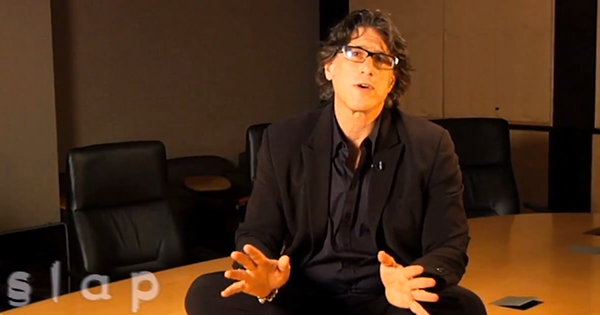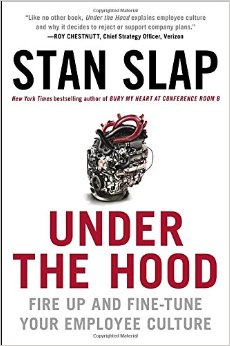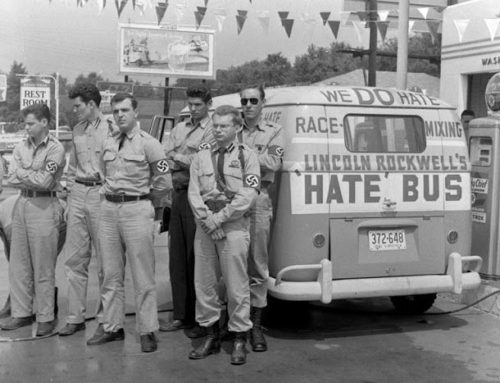 I had the pleasure of meeting Stan Slap last week and getting an advance copy of his new book, Under The Hood: Fire Up and Fine-Tune Your Employee Culture. Stan spoke at a meeting of one of our client’s dealer meetings, to a room full of business owners and he’s an original. When he boiled corporate culture down to this: “Culture is the stories people tell. The stories are about you. And you’ll never hear what they are,” I was sitting between the division president and the CEO. The CEO was laughing so hard I thought he was going to choke, so I gave him a fist pound on his knee and he chuckled, “I know. I know.”
I had the pleasure of meeting Stan Slap last week and getting an advance copy of his new book, Under The Hood: Fire Up and Fine-Tune Your Employee Culture. Stan spoke at a meeting of one of our client’s dealer meetings, to a room full of business owners and he’s an original. When he boiled corporate culture down to this: “Culture is the stories people tell. The stories are about you. And you’ll never hear what they are,” I was sitting between the division president and the CEO. The CEO was laughing so hard I thought he was going to choke, so I gave him a fist pound on his knee and he chuckled, “I know. I know.”
Later, I told Stan that people laugh because it’s true. And Stan Slap is true in a way others rarely get to. Maybe it’s because he’s an original and maybe it’s because he’s not just writing about culture, he’s doing it. He works with major corporations to help them understand why everything they’re doing to engage their employees and customers is failing. And they he helps them change that.
 There’s so much BS out there about brands and about culture. People think brands are created by ads and marketing. Some people think a logo is a brand. And people think cultures are built by great leaders. No. In culture, “top down becomes topple down. So what is a corporate culture? As Stan defines it, an employee culture is “a profound search for safety and meaning.”
There’s so much BS out there about brands and about culture. People think brands are created by ads and marketing. Some people think a logo is a brand. And people think cultures are built by great leaders. No. In culture, “top down becomes topple down. So what is a corporate culture? As Stan defines it, an employee culture is “a profound search for safety and meaning.”
Think about when you were a kid. Adults might have had some insight into your experience because they’d been kids themselves once (but probably not). But they didn’t have insight into the culture of you, your brothers and sisters, and all your little friends. Because kids form a culture that is a search for safety and meaning. If you’re a parent yourself, you know that in a different way. You know your children live in a world and a culture that you can’t enter. That culture is based on stories. And the stories are about you. Whether you’re safe. Whether they have faith in you. And whether it’s about a culture of kids, a culture of co-workers or a culture of customers, the thing you need to understand is it’s not about your intent or your strategy. It’s about why they should care.
And there’s the other point Stan drives home. What you say about your brand or your culture is irrelevant. It’s what the culture says about your brand that matters. The culture of your customers and the culture of your company. Was Chevrolet really “The Heartbeat of America” as their tagline used to say? Maybe, if the heartbeat of America is bankruptcy, failure, poor planning and shoddy workmanship. Was Chevrolet “Like a Rock?” Only if you consider the way their stock sank. To me, “The Heartbeat of America” is a fair day’s work for a fair day’s pay, a better day’s pay for your kids someday and neighbors you feel comfortable leaving your house key with. And when I find brands that resonate with that feeling, I’m a fan. Whether I’m a customer or part of the team.
Because here’s the other half of that: we as customers can’t resonate with a brand if it doesn’t resonate with its own employee culture. Because we, as customers, are employees, too. If you’re a leader, then, as your customers and as your culture, have a vision statement: Keep a wary eye on you.
Stan offers the Seven Deadly Sins of Cultural Commitment. “The original sin is the failure to respect the absolute power of an employee culture to make or break any management goal – or any manager.” Or as I like to say, “Your culture will eat your strategy for breakfast.” If your culture wants something to happen, it will. If the culture doesn’t want it to happen, it won’t.
“Successful implementation (of strategy) starts with being able to enroll you’re employee culture in fierce support of the strategy,” Stan writes. “If you can’t, and you think any strategic or performance goal will be successful without the hardcore support of (your culture), you’re building a base camp on Mt. Delusional.”
The bad news is that cultures, by their nature, don’t want to change. Cultures live by the known rules of survival and emotional prosperity. Uncertainty is perceived as an attack on those rules. But here’s the good news: ““A culture is never more united when it is aroused, either by attack or by inspiration.” When that happens, an employee culture is unusually receptive to leadership. And leadership is about emotional commitment. “A manager’s emotional commitment is what solves problems that are unsolvable; creates energy when all energy has been expended; and ignites emotional commitment in others, like employees, teams and customers.”
Stan’s new book is a great read. And more than that, it’s rich with practical advice for how to build an authentic culture in your organization. The advice starts with the most important cultural rule of all: Be a human first and a manager second.


